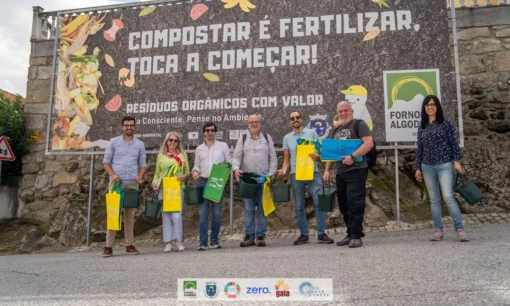
The Muxagata Aldeia Sustentável project in Portugal
The village of Muxagata, located in the interior region of Portugal (Beira Interior), has 240 inhabitants, a very small and aged community at 9 km from the main town Fornos de Algodres.
The municipality undergoes economic and social challenges, with a rather ageing population and less favourable access to main communication axes. Moreover, a bankruptcy process hit the town a couple years ago, leading to a very strict procedure of expenditure control for the next three decades. Waste management also undergoes serious challenges, with very low separate collection and recycling rates, and waste management costs ramping up.
The current municipal team decided to revert the situation, yet starting from one of the segregated villages that are more easily targeted for pilot projects. The idea of “Muxagata Aldeia Sustentável” was to introduce a door-to-door collection system for biowaste, with bins, and for recyclables, with bags. Collection is performed by local public employees, 3 times a week. Biowaste is then treated in a community composting unit, constituted by 6 1m³-composters, plus a storage unit for wood chops and another for tools. Recyclables are instead transferred to the regional waste management facilities. On top of that, around 400 kg of coffee grounds collected in the whole municipality each month are transferred to this composting unit for treatment (mixed with biowaste from households and wood chops).
The technical support is provided by ZERO consultants, who also gave the first workshop on community composting to local technicians.
Some data:
- 101 users (mostly domestic, a couple non-domestic but waste generation is equivalent)
- 79% participated at least once
- 55% participate regularly in d2d (recyclables and/or biowaste)
- 45% participate regularly in d2d (recyclables)
- BIOWASTE: 50-100 kg per week, 0.5 ton collected in the first 6 weeks
- RECYCLABLES: 1.2 ton collected in the first 6 weeks
- Events, usually involving some 80-120 people eating together for some reason, are a good opportunity to showcase how waste sorting should be made
The next step, to happen in the next weeks before Christmas is to remove 30 bins of mixed waste (770 liters size), and they will be replaced by around 20 120-litre bins, with free access. The small size will make more visible when sorting doesn’t happen correctly, creating some kind of common judgement on the ones not complying The stickers for these bins are being printed now, with clear nomenclature and indications of what can be deposited, also indicating that random controls will be made as regards mixed waste composition.
Read the press release (in Portuguese)